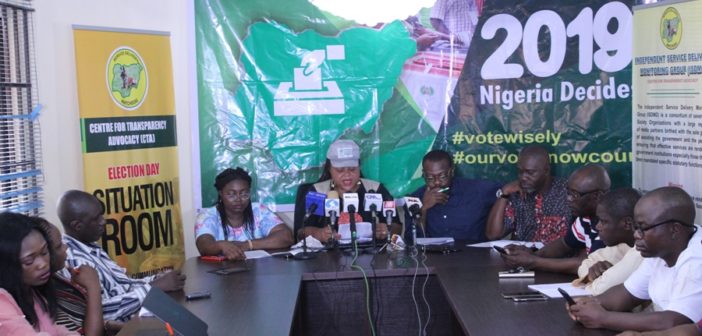INTERIM REPORT BY CENTRE FOR TRANSPARENCY ADVOCACY (CTA) SITUATION ROOM ON THE GOVERNORSHIP, STATE HOUSES OF ASSEMBLY AND FCT ELECTIONS ON MARCH 9, 2019
The Governorship, State Houses of Assembly and FCT council Elections held on March 9, 2019 across the country. The election was marked by low voter turnout, violence, intervention of the military in some places, and killing of citizens who had come out to exercise their franchise. INEC offices in some states were burnt, citizens intimated, in our opinion citizens should not lose their lives for participating in election.
We note, a remarkable improvement in the logistical arrangements leading to early deployment of personnel and materials and early commencement of polls. Centre for Transparency Advocacy (CTA) trained and deployed 1000 accredited domestic observers across the states of the federation. The following is our preliminary report, based on the findings of our field observers:
Time of Arrival of INEC Officials and Materials
Reports from field observers from across the county indicate early arrival of INEC officials and materials. Accreditation and voting started simultaneously between 8 am and 8.30 am in many polling units.
Time of Arrival of Security Agents
CTA Observers, in most polling units, reported early arrival of security agents drawn from the police and other security agencies, notably the Nigeria Security and Civil Defence Corp, Nigeria Prisons Service, Nigeria Immigration Service, Federal Road Safety Corps, NDLEA and Nigerian Customs Service.
Voter turnout
Voter turnout was generally poor across the country as compared to the presidential and National Assembly elections.. this was attributed to the violence that marred the presidential election In many areas, voters who came out to vote were of the impression that perhaps the reason why others didn’t come out was because their votes in earlier elections did not count and didn’t see the point in coming out to vote.
However in some specific areas there was large turnout of voters and upon further investigation, those areas were identified as the strong holds of certain candidates. Citizens deployed various ways to get voters out to vote such as the use of town criers but this still did not yield its desired objective.
Performance/Conduct of INEC Officials
Observers reported adequate deployment and readiness of INEC officials who were organised and eagerly waited for voters to turn up for accreditation and voting. Adequate attention was paid to people with special needs such as pregnant women, the elderly, people with disabilities, nursing mothers, etc. However, there were reports of Adhoc staff having challenges using the card readers in some areas, this though was quickly resolved.
Performance/Conduct/welfare of Security Agencies
Security agents appeared to have conducted themselves well in many voting units; but in many voting units across the country, our observers reported that security agents, particularly officers of the Police Force and the Armed Forces, were involved in the disruption of the voting process, harassment of INEC officials and election observers. For example, there was the case of INEC officials and observers held hostage and their personal effects, such as phones, seized at Ward 7, Unit 14, in Oruk Anam, Akwa Ibom State. Our observers also reported that security agents raided a nearby polling unit. A CTA observer narrowly escaped being held by the marauding security agents.
Our observers reported that there was adequate deployment of security agents, though in many of the units observed, they acted more like onlookers than law enforcement agents. They failed to act even when electoral crimes were committed in their presence.
There is a marked improvement in the welfare of the security personnel in terms of their transportation and early payment of their allowances.
Conduct of Political Parties/Voters (Vote buying and vote selling)
Observers reported many incidents of vote buying which were done in the presence of security agents. Vote buying was in the form of cash and food items. There was the particular example of polling unit 003 Ukwutia, Utwugwang North in Obudu Cross River State, Yammah Viewing Centre Unit Kwali Area Council (FCT), and Dutse Alhaji in the FCT where biscuits were shared to voters to vote a particular candidate.
In some places observers reported that husbands were voting for their wives and children voting for their parents. When these reports were brought to the attention of the security agents on ground, they looked the other way.
Welfare of Ad Hoc Staff/NYSC Members
In some polling units across the country, the National Youth Service Corps (NYSC) Ad-hoc staff members complained of not being paid their allowances and this affected commitment. In Lagos for instance, NYSC members were reported to have protested over non-payment of their allowances thus preventing voting from taking place in the affected areas.
However, they commended the logistics arrangement this time compared to the presidential elections.
Political Class
The role that politicians play in under mining the electoral process in the country continues to be of concern to CTA, as the final beneficiaries of the electoral process they should be seen to help to maintain the credibility of the ballot. Party agents were seen on the field without the proper accreditation cards from INEC , they were the chief organisers of the vote buying and electoral fraud across the country.
Collation of results
Reports from the field indicate that results are already being collated across the country and winners declared.
Conclusion
Compared to the Presidential and National Assembly elections, logistics arrangements for the Governorship and State Houses of Assembly elections were better organized and this ensured early opening of polls across the country.
In comparison to the excitement and enthusiasm voters showed during the presidential elections, the elections of 9March 2019 were marked by a high level voter indifference or apathy. Most Nigerians, who seem to have seen no reason to vote because of their disappointment with the outcome of the last election, reasoned that it was a waste of time coming out to vote when their expectations are marked with uncertainties.
CTA remains committed to contributing her quota in ensuring credible elections in the country.
Faith Nwadishi
Ag. Executive Director

